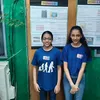With three simple raw materials, this woman entrepreneur’s startup offers a range of sustainable lifestyle products
Started in January 2020 by Nitika Sonkhiya, MyOnEarth went on to clock a turnover of Rs 50 lakh in less than a year, despite the pandemic and subsequent lockdowns.
Nitika Sonkhiya first used a bamboo toothbrush six years ago. As she continued to replace everyday products made of plastic with sustainable alternatives, she realised that an eco-friendly lifestyle was not a far-fetched idea.
She also realised that many people shared her love for nature but sustainable living had not become a lifestyle choice.
“I see that people want to make a change. The problem is that these products are not available in the local kirana shops and people end up buying what is available at an economical price,” Nitika tells HerStory.
An engineer by education, she quit her corporate job as a project manager at HCL and started MyOnEarth in January 2020.
Starting up
Based in Delhi, MyOnEarth offers a range of natural products made from only three ingredients - bamboo, coconut coir, and coconut shell, which is a waste product for farmers.
Its range includes kitchen and home décor, personal care, travel, fashion, and stationery. The products are cutlery made from coconut shells, bamboo toothbrush and other dental hygiene products, plantable seed pencil, among others.
MyOnEarth began with a B2B model catering to domestic and international clients including Earthy Crafts, Mark Mulholland, Andreas, Claudia, and Victoria. The pandemic pushed them to venture as a D2C brand and now their products are available in several retail stores in Bengaluru.
They are also sold pan India through the startup’s website and select ecommerce stores focused on sustainable brands. “I did not choose Amazon and other major platforms because there is a lot of returns and our products are fragile and frequent shipping might break them,” says Nitika.
The entrepreneur says the venture also creates opportunities for women artisans in rural India.
Nitika partnered with a Jaipur-based NGO that empowers local women with regular work to empower them financially, and has nearly 50 artisans working on design and handicrafts for MyOnEarth. “Although not directly employed, it has become the only source of income for these women during the pandemic,” Nitika adds.
Started with an initial investment of Rs 10 lakh, the startup is targeting metropolitan cities where the population is more aware. She says partnering with social media influencers to promote and market the products has helped in growing their online presence.

Products by MyOnEarth
Solid future for sustainable businesses
Although thriving, Nitika believes that the eco-friendly market in India is at a very nascent stage and disorganised at the moment.
Nitika hopes to continue with her endeavour to make eco-friendly products accessible, which has been the focus since inception. She says affordability is important so that sustainable living is not limited to the luxury segment alone.
She believes accessibility is a major impediment for people to adopt an eco-conscious lifestyle. She says products should be available in local drugstores and kirana stores because a consumer in need is not likely to order online and wait for a week. MyOnEarth plans on entering supermarkets initially, followed by kirana and local stores.
While handmade products tend to be priced higher than the commercial products due to lack of machine intervention, Nitika says their bamboo toothbrush, initially priced at Rs 99 is now being retailed for Rs 60 and she hopes to bring down the price further.

In less than a year, the startup has clocked revenues of Rs 50 lakh and Nitika says meeting the demand is a challenge.
“We have seen this growth despite the COVID-19 pandemic and the subsequent lockdowns. I am confident of our far-reaching impact in this industry,” she says.
“This is the future, not just in India but globally with huge demand. We need to ensure adequate supply and soon the world will switch from China to India.”
Edited by Rekha Balakrishnan









